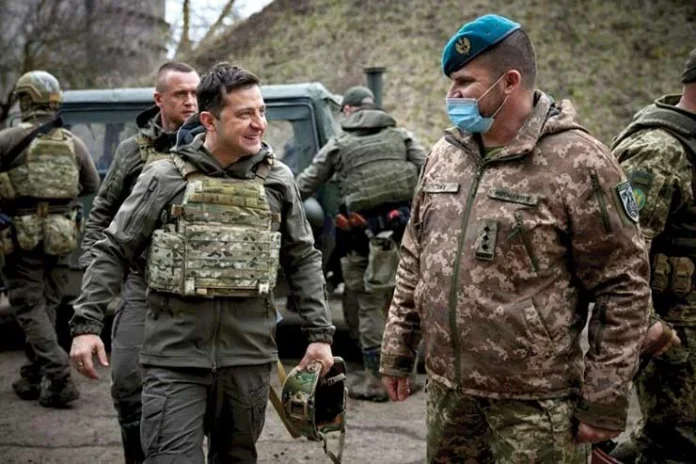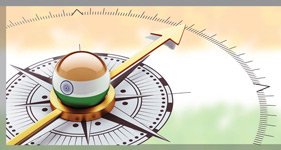The war in Ukraine is reverberating across the world with the cataclysmic human tragedy in terms of the scale of death and destruction ever witnessed since the Second World War, its economic strangulation and above all the threat to sovereignty of an independent state in a globalised word. Beyond the suffering and humanitarian crisis, the entire global economy has retarded into a sluggish growth fuelled by acute shortages of essential commodities, rising prices that has spiked inflation and last but not the least the widespread devastation of cities that no longer exist is unimaginable besides the utter disregard to international norms. In sum, the impact of this invasion is directly proportional to the proximity to the ground zero, Ukraine, a devastated country in its entirety and a Europe grappling with the surge of refuges, energy shortage, disrupted trade and severe impact on supply chain in general.
Amidst the global clarion call for denouncing the invader Russia, India on the other hand has a mixed bag of responses. Its diplomatic response has become an enigma and a topic of global interest. On the face of it India continues to “maintaining strategic autonomy,” by strongly relying on its stated foreign policy of neutrality that aligns with its national interests. The direct fall out has been its refusal to toe the lines the West, chiefly the United States and its NATO allies in isolating Russia by abstaining from several votes in the United Nations Security Council and General Assembly on the issue of censuring Russia for its unprovoked attack on Ukraine. It has also abstained from resolutions brought in by Russia as well. In fact despite being part of the Western alliances such as the Quadrilateral Security Dialogue, it continues to buy weapons and oil from Russia. This tight rope walk of trying to balance its relationship with the West and Russia, with whom it has deep historical and strategic ties, has informally raised its stature as a mature democracy.
India’s Strategic Standpoint
A deeper analysis of India’s response to the Russian invasion of Ukraine has been very distinctive and measured among the major democracies around the world including the US and its strategic partners. Despite its discomfort with the Russian invasion, India has adopted measured public neutrality toward Russia. As highlighted earlier, it has abstained from successive votes in the UN Security Council, General Assembly, and Human Rights Council that condemned Russian aggression in Ukraine and thus far has refused to openly call out Russia as the instigator of the crisis. For many in the United States, including in President Joe Biden’s administration, India’s neutrality has been disappointing because it signalled a sharp divergence between the US and India on a fundamental issue of global order, namely, the legitimacy of using force to change borders and occupy another nation’s territory through a blatant war of conquest. Whatever their views on the genesis and the precipitants of the Ukraine war, the global community would admit that India’s diplomatic neutrality ultimately signifies a subtle pro-Russian position based on its years of diplomatic interdependence tilting more in favour of India’s defence and security needs. This seems particularly incongruous today because India stands shoulder-to-shoulder with the United States in opposing Chinese assertiveness in the Indo-Pacific while at the same time appearing tolerant of the vastly more egregious Russian belligerence in Europe.
That notwithstanding India has also managed to convey its perception on the crisis that has caused a human catastrophe explicit in the immeasurable exodus, damage and destruction of human lives and property. These perceptions have been put forth by way of India urging “respect for the sovereignty and territorial integrity of states,” calling “for the immediate cessation of violence and hostilities,” and regretting “that the path of diplomacy was given up”. It strongly urged the concerned states to “return to diplomatic dialogue,” and reiterated that “dialogue is the only answer to settling differences and disputes, however daunting that may appear at this moment.” Its reiteration of its position “that the global order is anchored on international law, the UN Charter and respect for the territorial integrity and sovereignty of states” further amplifies India’s stand on the invasion without directly contributing to the global tirade. India thus sought to convey its consternation with Russian actions, but refused to condemn Moscow transparently.
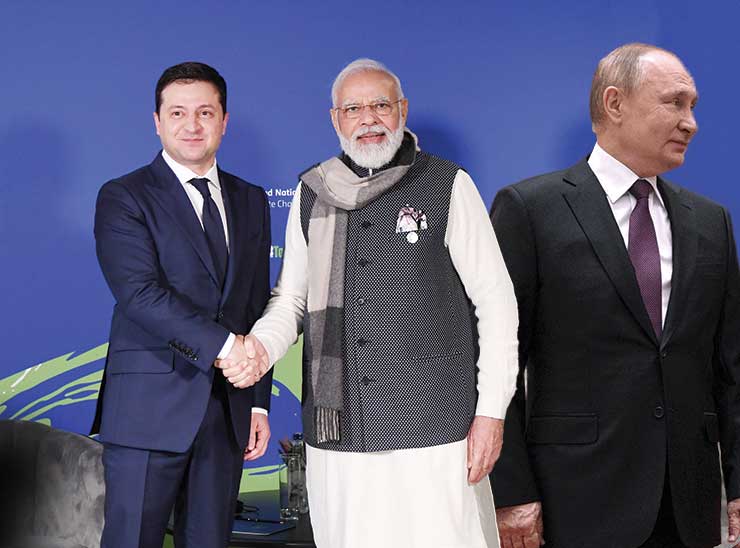
Perceived Interest for Indian public neutrality
In the first instance, India’s public neutrality toward the Russian invasion is driven fundamentally by its concerns vis-à-vis China and Pakistan. Both these states are immediate and enduring threats, and it believes that preserving its friendship with Russia will help to prevent deepening Russian ties with China and to limit Russian temptations to build new strategic ties with Pakistan. Both China and Pakistan desire closer ties with Russia which India is not comfortable with. Consequently, the aim to minimise Russian proximity to both of its rivals is a strategic necessity. Toward that end, it has concluded that studiously avoiding any open criticism of Russia offers it a chance to arrest the tightening Sino-Russian embrace while preventing a new dalliance between Russia and Pakistan, both of which undermine India’s core interests.
Another serious consideration to reinforce this geopolitical calculation has been the long standing relationship with Russia since 1955 when the erstwhile Soviet premier Nikita Khrushchev publicly declared his support for Indian claims over Jammu and Kashmir. Keeping Russia on its side through its veto-wielding prerogatives thus remains an important consideration which reinforces India’s reticence to criticise Russia, even when its behaviours are judged to be deplorable and on occasion undermining India’s vital interests. On this count, India’s posture today remains fundamentally consistent with its past forbearance in the face of previous Russian aggression, for example, in Hungary in 1956, in Czechoslovakia in 1968, and in Afghanistan in 1979. Thus India has been excessively considerate when calling out Russian misdemeanours, a courtesy that historically has never been equally extended to the United States.
In the face of this divergent response, the underlying reason for this asymmetrical treatment is that India now has a durable view of Russia as a “dependable partner.” The evidence often trotted out in justification is that Russia supported India against US pressure during the 1971 Indo-Pakistan war and it has never meddled in Indian domestic politics, unlike the United States, which has done so on many occasions. The evidence undermining this unfair comparison with Washington despite US assistance including food aid to India early in its post independence history, US military and political support during the darkest moments of the 1962 Sino-Indian war when the Soviet Union was either ambivalent or supported China, and the more recent, US-Indian civilian nuclear cooperation agreement—unfortunately does not seem to credibly count, in contrast. Consequently, between the nostalgia about Russia being “a very reliable and long term partner” and the suspicion that the United States could prove to be “a fickle and uncertain strategic partner,” the threshold that must be crossed to provoke any Indian public criticism of Moscow is extremely high.
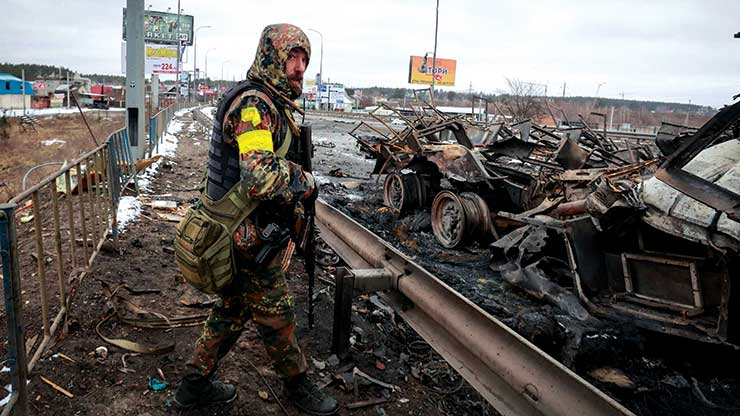
That apart, one of the most significant factors of India’s benign stance towards Russia has been India’s continuing dependence on Russia for military equipment. It only deepens its reluctance to alienate Russia in any way. This aspect has received widespread attention since the beginning of the Ukraine war, but it is ultimately secondary to the larger calculations that centre on preserving strong ties with Russia as part of India’s efforts to both balance China while constraining Pakistan and realise a multipolar system where it cannot be hemmed in by any excessively powerful states. All the same, the current dependence on Russia for the much needed spares and support necessary to maintain its large inventory of Russian-origin military equipment is factually real and cannot be dispensed with.
However in this growing ambivalent geopolitical state, India has begun to diversify its arms purchases away from Russia during the last two decades. That apart, Russia still remains a critical and a highly desirable source of weapons for India. This is because Russian weapons are usually cheaper in comparison to their Western counterparts, at least as far as their initial costs go, and they are often just as good, or at least good enough, for India’s operational needs. Moreover, Russia alone, again in contrast to the West, is often willing to provide India with the high-leverage strategic technologies that others will not, has pursued the codevelopment and coproduction of advanced weapons systems to pave the way for their manufacturing in India, and does not burden India with excessive end-user constraints, thus making India’s defense relationship with Russia even more valuable. The bottom line, therefore, is that India would be unwilling to jettison the defense supply links with Russia, even if it could procure comparable weapons from alternative Western sources, because the tie with Russia offers it important technological and political benefits.
Having said all this, Indian policymakers are aware of the risks accompanying their current public neutrality toward Russia. It exposes the inconsistency in India’s commitment to protecting the rules-based order in the Indo-Pacific over that in Europe, at a time when its biggest international partners, economic and strategic, are both united in their determination to penalise Russia and at odds with India’s posture on Ukraine. It also leaves India in the company of strange bedfellows such as China and Pakistan, which happen to be India’s adversaries and have behaved toward India as Russia has toward Ukraine.
India’s Economic Opportunism
From a positive standpoint, India’s political neutrality over the war in Ukraine has expanded its economic opportunism. For starters, India has boldly gone ahead with importing Russian oil at a much cheaper rate. The stated position of the government has been that the Government of India’s motivations are purely economic, not political and in the interest of its people. China also seems to follow a similar strategy of oil imports. Thus these actions grossly undermine the intended financial strangulation of Russia by way of western economic sanction. In so far as India is concerned it seems to have a dual impact of projecting Indian diplomatic independence, even evoking applause from its adversary namely Pakistan, and a perceived alignment with China in resisting western pressures.
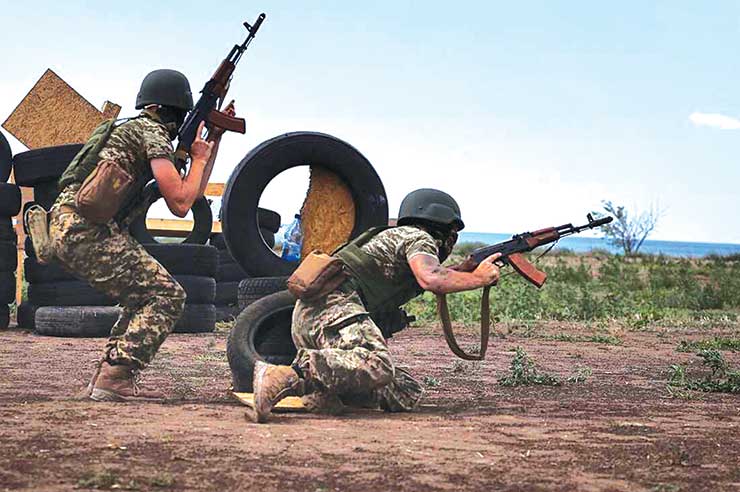
India’s Urge for Self-Reliance
One of the significant fallouts has been to spur a self-reliant or Aatma Nirbhar Bharat in the aftermath of the Ukraine crisis. In fact, the perceived backlash of big technology companies “weaponising internet and presiding over splinternet” amidst the Ukrainian crisis has been worrisome. On the contrary, India has the potential to reverse this trend where big technology firms like Google Pay, Apple Pay, and MasterCard pulled out of Russia following the Ukraine crisis, and Russian banks were cut off from the Society for Worldwide Interbank Financial Telecommunications (SWIFT) payments system. Thus, there is a dire need to be self-reliant in this new geopolitical reality.
Having said this, the immediate fallout has been a push for several reforms and policies to reduce import dependence. The key to this has been India’s push for making domestic manufacturing viable and attractive for global companies through the production-linked incentive (PLI) schemes and public procurement orders that promote buying goods with more domestic content, similar to Biden’s “Buy American” program. In addition, one of its technological strong points has been the roll out of Aadhaar, the world’s largest biometric identification system.
The success of Aadhaar, India Stack and its applications such as the Unified Payments Interface and electronic Know-Your-Customer platforms have fundamentally transformed several economic sectors in India. As Russian banks were cut off from SWIFT international system and tech companies pulled out of the country following Russian invasion of Ukraine, Indian experts pointed out how India Stack ensured that India would never fall prey to any blackmail by global tech companies. Thus companies and governments are embracing a more emboldened Indian government on the self-reliance front. The aim is to strengthen India’s case for data localisation, creation of a resilient internet network architecture, develop a native open API (application programming interface), and a strong cyber security command centre, thereby making it a prominent feature of India’s technology ambitions.
Impact on global food security and India
The ongoing war between Russia and Ukraine has spiked a global food crisis that stems from the fact that Russia and Ukraine are the granaries for the world in terms of wheat supply but are unable to maintain regular supply. Ukraine is amongst the largest global exporters of wheat, sunflower, barley, rapeseed and maize with share of 10 per cent, 47 per cent, 17 per cent, 20 per cent and 14 per cent of global exports. Russia also has strong presence with global exports of 25 per cent, 18 per cent and 14 per cent in sunflower, wheat and barley. However, given this impasse it is all set to positively benefit India agricultural economy. The fact the war has spiked shortages prompted India to meet the void by way of exports of agricultural produce. Large quantities of wheat have been shipped to meet the growing global demand. Unfortunately, this has not been without its pitfalls and oppositions from a few reticent countries. That notwithstanding the opportunity is huge for Indian agricultural sector.
In conclusion, it may be fair to assume that while Russia is unrelenting in its pursuit of its operations in Ukraine, the west on the other hand is arming Ukraine to fight their proxy war against Russia. There is, thus, no clear end to it at least in the near future. Four months into the war, the world has fallen into a state of an uneasy thaw where local priorities including the threat of a resurgence of Covid are lulling the war hysteria leaving the Ukrainians to fend for themselves. Under these circumstances, India’s political ambivalence may appear skewed in the global context but it is highly favourable in the domestic landscape.
–The writer is a former GOC-Indian Army and presently a Strategic Consultant & Principal Advisor. Views expressed are personal and do not necessarily reflect the views of Raksha Anirveda
–The writer is a former GOC of the Indian Army and presently serves as a Strategic Consultant and Principal Advisor. The views expressed are of the writer and do not necessarily reflect the views of Raksha Anirveda


